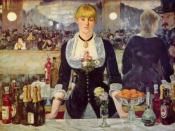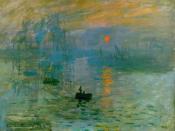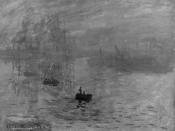Painting in the Second Half of the Nineteenth Century
During the second half of the nineteenth century, the ideal of self-determination
fostered by the French Revolution and spread by Napoleon helped spawn a revolutionary
spirit across Europe. This spirit of rebellion also infected artists of the period. Painters
began to challenge the philosophy and the aesthetic principles of the academies, looking
outside these conservative institutions for their training, subject matter, style, and
purpose. While many artists and critics promoted the status quo, others sought change,
seeing validity in new themes and new approaches. To many artists, the histories and
mythologies still promoted by the academies offered no inspiration, and so they turned
elsewhere for their subject matter. Some looked to nature, others to daily life, and still
others to themes of the worker, the poor, and the oppressed. As they sought alternatives,
many artists gathered in groups based on common interests.
Outside the established
mainstream of their own time, the Realists, the Impressionists, and the Post-
Impressionists broadened the horizons of Western art.
Gustave Courbet (1819-1877), a self declared Realist, rejected the inherent
sentimentality of work by the Romantics. Courbet's interest in portraying things as they
really appear, together with his nonacademic orientation, placed him in the front rank of
the quest for realism, the premise for much of the artistic activity of the period. Michael
Wood quotes Courbet as saying: "It was not my intention of attaining the trivial goal of
art for art's sake. My aim is to translate the customs, the ideas, and the appearance of my
own epoch as I see them." According to Janson "The storm broke in 1849, when he
exhibited The Stone breakers, the first canvas fully embodying his programmatic
Realism" (dcv). Courbet was inspired by the complete expression of human misery he...



Interesting
I found a copy of this essay here http://www.essaymill.com/free_essays/inmers/m1168. htm
What bothers me more though is that I am sure I had read it else where as well.
3 out of 3 people found this comment useful.